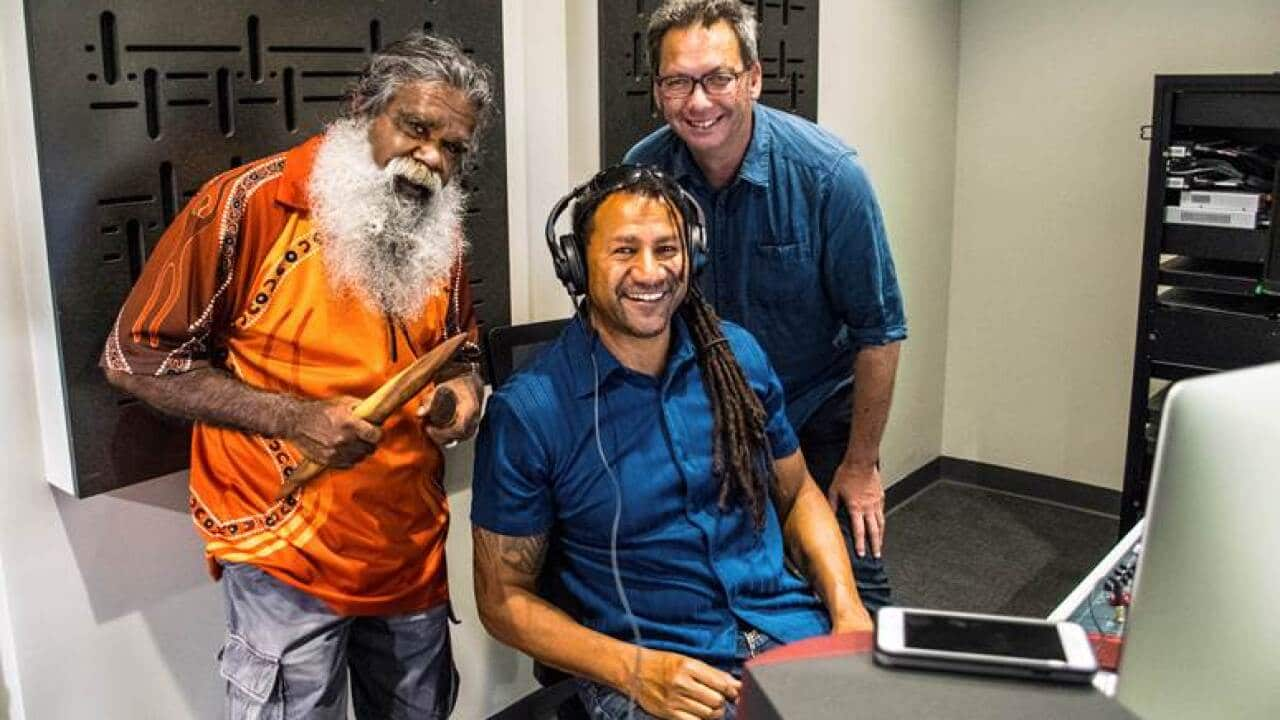combines three bodies of the university that promote Aboriginal music and language.
Three key units that will work in partnership:
- The Centre for Aboriginal Studies in Music, which offers foundation studies for Indigenous Australian music students seeking entry into degree programs.
- Kaurna Warra Pintyanthi, which is engaged in the reclamation and teaching of the Kaurna language of the Adelaide plains.
- The Mobile Language Team, which supports the revival and maintenance of the 45 Aboriginal languages identified throughout South Australia.

Source: Supplied
“If you have a connection with a place, when you leave you’ll always be called back to it…The wind will be calling to you and the rain will be crying for you to return.”
These are the lyrics from Ms Yates track titled the ‘Calling Song.’ A song selected to be performed on a day that represents connection to culture at a new centre. “With language music is a fantastic tool, it’s passed down and it’s something that hits you hard - so if we can keep combining music and language together it’s a way we can keep restoring it and making sure it’s passed down to future generations.”
“With language music is a fantastic tool, it’s passed down and it’s something that hits you hard - so if we can keep combining music and language together it’s a way we can keep restoring it and making sure it’s passed down to future generations.”

Music student Hannah Yates performing in the new music studio, for the launch of NCALMS. Source: Supplied
From a young age Ms Yates knew that music was her calling, and not just because she was talented at playing and singing it, but because she could use her lyrics as a powerful tool.
“I wanted to sing so I could use my voice to have a voice to be heard and to send out strong messages,” she said.
Her very first song ‘Can’t Fight the Dream’ is all about the people of the Stolen Generation.
“The idea is that you can hide from something in the daylight but it will always come out through your dreams,” she said.
“The theme of the song is that we may not personally be affected by the Stolen Generations but the common factor is that we’ve all had someone taken away from us so we need to be united with our loss.”
Ms Yates says a focus on Indigenous languages and music is crucial for the youth of the future.
“This is pushing Indigenous music and Indigenous communities into mainstream music which is enabling students a better opportunity for their future.”
Director Aaron Corn says the centre aims to strengthen Australian Indigenous communities through education, cultural development, and innovative collaborations in language and music.
"Learning language through music and song is the easiest way to learn a new or old language.”
"Language and music are intrinsic to the expression of culture, and are intertwined with the health and wellbeing of Indigenous people… and through language and song, Indigenous people traditionally understand their relationships with community, law, country and ancestors,” he said.
In a constantly changing and evolving world, where preserving languages presents Indigenous communities with unique challenges, the Kaurna Warra Pintyanthi and Mobile Language Team programs aim to facilitate researchers and Aboriginal language speakers to work together collaboratively.
"By combining the expertise of each of these distinct groups – where they can operate simultaneously as independent entities and as a collaborative body – we will provide a dynamic, innovative environment," Professor Corn said. The Centre for Aboriginal Studies in Music was established by ethnomusicologist Catherine Ellis and numerous Aboriginal leaders in 1974.
The Centre for Aboriginal Studies in Music was established by ethnomusicologist Catherine Ellis and numerous Aboriginal leaders in 1974.

Professor Aaron Corn being interviewed in the new KWP puppet studio. The puppets are used to help teach the Kaurna Aboriginal language Source: Supplied
It remains Australia’s only dedicated centre for scholarly teaching and research into Australian Aboriginal music.
Kaurna man of the Adelaide plains and a Language Media Officer with KWP, Steve Gadlabarti Goldsmith, welcomes the formation of the new national centre.
"We're able to work with other language workers, which means we can see how other Aboriginal groups, are recording and reviving their languages," he said.
"Learning language through music and song is the easiest way to learn a new or old language.”
"Warra ipila palti – language though music and song!"
According to Professor Corn, the national centre will not only help develop new strategies for strengthening Australian Indigenous music and languages but will also offer valuable new pathways for emerging Indigenous leadership in these fields.
"It is important to ensure that Indigenous Australian languages and music have a future, and that Indigenous people have appropriate opportunities to take on leading roles in ensuring that future. Our new centre is an investment in this vision,” he said.
"The centre will enable Aboriginal and Torres Strait Islander people to develop and acquire knowledge that is vital to ongoing maintenance of their languages, music and culture, and their continued growth in the contemporary world."
Professor Corn hopes all people understand the reason behind this new centre, his message being loud and clear:
“Indigenous cultures and languages are part of our national heritage and that’s why supporting culture, language and music is so significant... so we can continue passing this on from one generation to another.”




